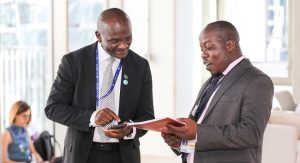As the first week of COP28 gets underway in Dubai, African Civil Society Organisations (CSOs) have issued a five-bullet statement on energy demands for Africa.

The statement was delivered to negotiators at COP through Ephraim Shitima, the Chair, Africa Group of Negotiators, who received the targets on Monday, December 4, 2028.
Delegations from the Global South have been outraged by the absence of provisions on energy access in the work programme on just transitions draft decision released at the ongoing climate talks.
The organisations argue that the climate crisis is both a development and energy issue in Africa and that establishing a decision on energy access within the just transition workstream is not an option.
Additionally, the CSOs emphasise that support for Africa to transition to renewable energy must be centred in the decision of the just transition if this is to guarantee justice for Africans.
The CSOs are now demanding for equity, transparency and human rights in the energy industry, an end to fossil fuels and historical responsibility by the developed world.
One of the priorities for Africa at COP28 was to secure deals that would triple investments in renewable energy on the continent after the Africa Climate Summit failed to deliver ambitious outcomes on renewable energy.
At the summit, renewable energy investments received largely lukewarm attention as the event hosted by Kenya rallied leaders behind the so-called green investments, namely carbon markets, as the solution to emissions that have been caused by fossil fuels.
In the statement, the CSOs are demanding:
- Equity and historical responsibility from developed countries for the climate crisis.
- Adherence to human rights and protection of workers, communities and ecosystems.
- Fair and transparent processes that provide opportunities for African countries to be at the centre of energy development decision-making on energy development.
- Accountability, transparency and involvement of stakeholders in all processes must be prioritised.
- An immediate phase-out of the fossil fuel era in all sectors, especially in developed countries that have benefitted from historical emissions.
The CSOs are also calling for the scale-up of renewable energy to more than 15,000 GW in 2030 or an average of 1500 GW annually to keep the 1.5°C temperature target within reach.
According to the movement, increased political support for and shift in global policy and investment in renewables is critical in a quest to attain renewable energy targets.
To the civil society, Africa needs a rapid roll-out of people-centred, environmentally and socially appropriate renewable energy on the continent as the solution to the climate crisis, energy poverty and an enabler to Africa’s development.
For years now, the African civil society movement has been calling for the immediate stop to misaligned climate support to the continent. Instead, they have been demanding the provision of genuine support from historical polluters to limit global temperature rise and to make it possible for the world avert a catastrophic future.
Amos Wemanya, Lead, Just Transitions, Power Shift Africa, said: “Renewable energy today offers a viable, cost-effective pathway for meeting Africa’s energy needs. Accelerating the swift and scaled deployment of renewables is not an aspiration but a necessity in Africa. COP28 must catalyse increased renewable energy investments on the continent for energy access. There is no climate justice without human rights. Renewable energy deployment and fossil fuel phase-out in Africa must respect fundamental human rights and rights of Indigenous Peoples.
“The fossil industry needs to be made to pay for the harms they have and continue to cause in African communities. This COP has the opportunity to facilitate course correction. This must be demonstrated by its ability to compel rich countries to support developing countries to meet transition and leapfrogging costs.”
Janet Milongo, Senior Officer, Global Platform of Action, added: “COP28 must be the forum that finally delivers for Africa. It must be the catalyst that finally changes the course of the region from a dark, retrogressive fossil fuel-driven energy system that goes against Africa’s interests. It must be our bridge to a bright, autonomous, empowering and abundantly African renewable energy system.
“A sincere commitment to a dignified energy future for Africa can only be founded by prioritising and centralising the needs of the African people. Africans must have full, fair and free participation in their energy transition. These commitments will only be meaningful and actionable when and if coupled with the finance required to meet the full scale of the African energy transition.”
Muhammed Lamin Saidykh, Head, Building Power, CAN- International, said: “It is crucial for Africa to prioritise building renewable energy systems, electrification, infrastructure and technologies with support from partners. It is gravely concerning that some climate solutions in Africa are driven by Western interests rather than the desire to truly benefit the continent. We need to reshape our agenda and involve African experts who understand our unique challenges.
“The promotion of false solutions like carbon credits and geoengineering is unacceptable. Africa must reject them. These approaches serve the interests of wealthy nations and corporations by allowing them to continue to pollute. We should prioritise Africa’s interests and that is to transition away from fossil fuels in a just and equitable manner.”
Safiatou Nana, Regional Coordinator, Climate Action Network Africa – CAN Africa, observed: “Renewable energy is not only a matter of environmental necessity. It is a cornerstone of social and climate justice and economic opportunity for Africa. Our continent’s potential in renewable energy resources and critical minerals is immense, and harnessing it is crucial for addressing both the climate crisis and energy poverty that affects 600 million Africans. We stand firm in our call for concrete, actionable commitments for just, fair, locally led 100% renewable energies for Africa by 2050.”
